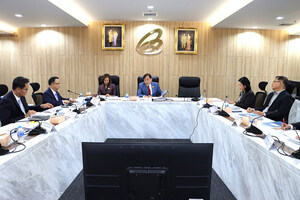LOS ANGELES, Jan. 3, 2024 /PRNewswire/ -- The National Electric Vehicle Policy Board (EV Board) meeting, which was chaired by Mr. Srettha Thavisin, the Prime Minister, continued the commitment to propel Thailand into a prominent regional hub for the Electric Vehicle (EV) manufacturing aligning closely with the 30@30 policy. Thailand aspires to manufacture Zero Emission Vehicles (ZEVs) at least 30% of the total motor vehicle production by the year 2030, or 725,000 cars and 675,000 motorcycles.
The EV Board has approved the second phase of EV Package, known as EV 3.5, for 4 years (2024-2027) to promote EV industry's continuous growth and to facilitate investment opportunities in EV manufacturing in Thailand for new players. The package aims to support investment covering the entire EV industry ecosystem. Companies who have already participated in EV 3 are eligible to apply these measures complying with the conditions and regulations.
As part of the EV 3.5 package, the government will provide subsidies for the purchase of electric cars, electric pickup trucks, and electric motorcycles based on the vehicle types and battery capacities. The subsidies will be provided in range as follows:
- For electric passenger cars priced not exceeding $58,000 USD, with battery capacity not less than 50 kWh will be subsidized in range between $1,450- $2,900 USD per unit. And those with battery capacity less than 50 kWh will be subsidized $580 - $1,450 USD per unit.
- For electric pickup trucks priced not exceeding $58,000 USD, with battery capacity not less than 50 kWh will be subsidized in range between $1,450 - $2,900 USD per unit.
- For electric motorcycles cars priced not exceeding $4,350 USD, with battery capacity not less than 3 kWh will be subsidized in range between $145 - $290 USD per unit.
The relevant agencies will discuss further to stipulate the subsidy rate as appropriate and propose to the cabinet's approval.
As part of the EV 3.5 package, those electrical passenger cars priced not exceeding $200,000 USD will be incentivized with the reduction of excise tax from 8% to 2%. While electrical passenger cars priced not exceeding $58,000 USD, importing EVs as Completely Built-Up Units (CBUs) during the first two years (2024-2025) will benefit additionally a reduction in import duties up to 40%.
Those companies applying to this package will be contingent on the condition of EV production offset domestically for CBUs imported at 1:2 ratio by 2026 and 1:3 by 2027. Both imported and domestically manufactured electric cars, the batteries must acquire the Industrial Product Standards (TIS) and pass testing based on international standards at the Automotive and Tire Testing National Center (ATTRIC).
In addition, the Board has approved an extension deadline for EV registration under EV 3 package from December 31, 2023, to January 31, 2024 in order to enable consumers planning to purchase EVs at the Thailand International Motor Expo and to complete the registration process.
"The EV 3.5 package reaffirm the Thai government's unwavering commitment, emphasizing a consistent policy that supports Thailand as a prominent hub for electric vehicles in the region. The strategic initiative involves attracting new players to establish production bases and encouraging existing investors to transition to the electric vehicle industry. These efforts will foster sustainable development for Thailand's automotive manufacturing sector, where currently Thailand holds the top position in ASEAN and ranks among the top 10 globally. Furthermore, these measures support Thailand's goal to move towards carbon neutrality by 2050," said Mr. Narit Therdsteerasukdi, the Secretary General of Thailand Board of investment and the Executive Committee Secretariat of EV Board.
In the first phase of the Electric Vehicle supporting program or EV 3 started from 2022, a total of 15 companies have participated, including electric passenger cars, electric pickup trucks, and electric motorcycles. The program has effectively invigorated the growth of the electric vehicle industry in Thailand. The first nine months of the program (January- September 2023) recorded new EV registrations for 50,340 units, marking 7.6 times higher compared to the same period last year. Thailand's continuous EV promotion package since 2017 have resulted in investment in the EV industry worth $1.8 billion USD in manufacturing battery electric vehicles (BEVs), battery electric motorcycles, EV's parts and components, and charging stations.
MEDIA CONTACT:
Suttida Tongdee
1-323-960-1199
[email protected].th
SOURCE Thailand Board of Investment







Share this article